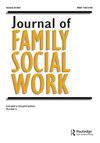Transition to parenthood: it does not get easier the next time. Exploring ways to support well-being among parents with newborns
IF 0.7
Q3 SOCIAL WORK
引用次数: 12
Abstract
ABSTRACT Investing in parents is important because their well-being is positively related to the development and well-being of their children. This study investigated which factors predict two types of parents’ well-being: individual well-being and parenting-related well-being. Participants were 416 parents (90 fathers, 326 mothers) of a baby (younger than age 1 year old), both first-time parents and not-first-time parents. Relationship quality, life skills, parenting skills, and social support were taken into account. Results show that both types of well-being have different main predictors. Self-esteem, self-management, and interpersonal relationship skills contribute to both types of well-being, suggesting that interventions aimed at improving these skills could be very beneficial for parents in their transition to parenthood. Fathers and mothers differ significantly on several predictors—for example, self-esteem, self-management, parenting behavior, and empathy—suggesting they might have different needs for support in the transition to parenthood. Finally, results show that, though parents get better at providing basic care for their children, regarding well-being and relationship quality, not-first-time parents are not better off then first-time parents. Therefore, interventions aimed at easing the transition to parenthood should not only be aimed at first time parents, they might be more effective for parents who already have children.向为人父母的转变:下一次不会变得更容易。探索如何支持新生儿父母的福祉
投资于父母是很重要的,因为他们的幸福与孩子的发展和幸福呈正相关。本研究探讨了哪些因素可以预测两种类型的父母幸福感:个体幸福感和育儿相关幸福感。参与者是416名婴儿(小于1岁)的父母(90名父亲,326名母亲),包括第一次父母和非第一次父母。关系质量、生活技能、育儿技能和社会支持都被考虑在内。结果表明,两种类型的幸福感有不同的主要预测因子。自尊、自我管理和人际关系技能对这两种类型的幸福都有贡献,这表明旨在提高这些技能的干预措施对父母过渡到为人父母的过程非常有益。父亲和母亲在几个预测指标上存在显著差异——例如,自尊、自我管理、为人父母行为和同理心——这表明他们在向为人父母过渡的过程中可能需要不同的支持。最后,研究结果表明,虽然父母在为孩子提供基本照顾方面做得更好,但就幸福感和关系质量而言,非首次为人父母并不比首次为人父母更好。因此,旨在缓解过渡到为人父母的干预措施不应该只针对第一次父母,它们可能对已经有孩子的父母更有效。
本文章由计算机程序翻译,如有差异,请以英文原文为准。
求助全文
约1分钟内获得全文
求助全文
来源期刊

Journal of Family Social Work
SOCIAL WORK-
CiteScore
2.10
自引率
0.00%
发文量
4
期刊介绍:
Each issue of the Journal of Family Social Work contains peer reviewed research articles, conceptual and practice articles, creative works, letters to the editor, and book reviews devoted to innovative family theory and practice subjects. In celebrating social workers" tradition of working with couples and families in their life context, the Journal of Family Social Work features articles which advance the capacity of practitioners to integrate research, theory building, and practice wisdom into their services to families. It is a journal of policy, clinical practice, and research directed to the needs of social workers working with couples and families.
 求助内容:
求助内容: 应助结果提醒方式:
应助结果提醒方式:


